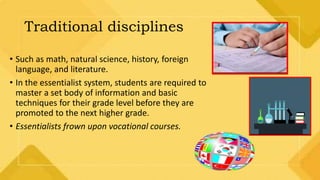The document discusses five major educational philosophies from the modern period:
1. Essentialism focuses on basic academic skills and character development through traditional subjects taught in a teacher-centered classroom.
2. Perennialism emphasizes ideas that have lasted for centuries and developing reasoning skills through sequenced mastery of content.
3. Existentialism aims to foster individual qualities and cultivate uniqueness by encouraging independent choices and commitment to values.
4. Progressivism promotes active, creative, social and democratic learning through student-centered exploration and questioning.
5. Reconstructionism critically examines institutions to identify inequities and encourages students to think critically about challenges and reforms as "change agents".































